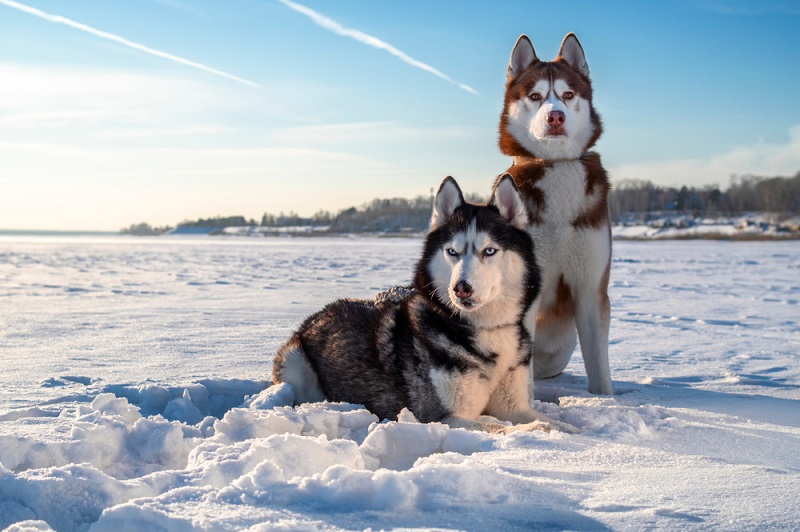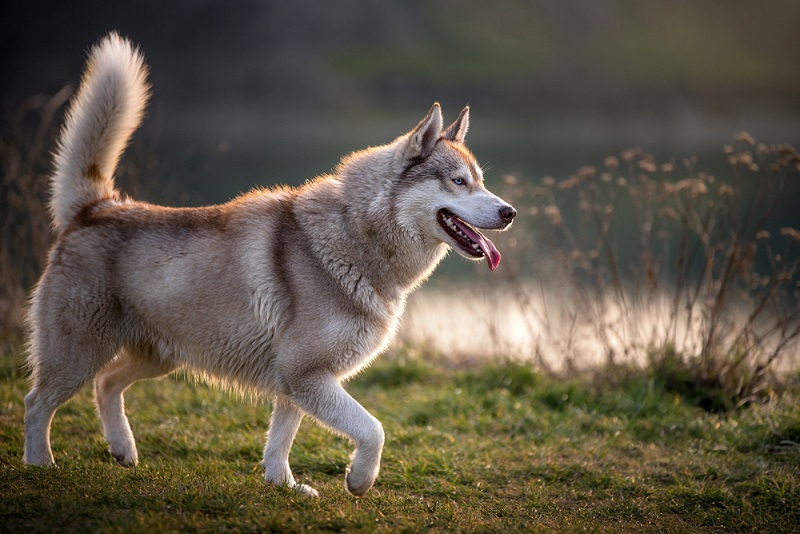Updated Match 19, 2024
If you’re a husky owner, you’re already familiar with their dramatic howls and playful personality—and just how easily these goofballs can wiggle their way into your heart.
And if you’re considering adopting a Siberian husky for the first time, these traits may be among the top reasons you want to make this charming breed part of your family.
To help your pet live the longest, happiest life possible, it’s necessary to know which doghealth problems this delightful working dog is prone to. While not all huskies may deal with these conditions, knowing the possibilities can help you catch any symptoms early on.
Whether you’re debating taking a husky home or you’re already living with one, we’ll discuss the most common husky health problems so you’ll know what to look for on your pup’s genetic report, what symptoms to keep your eyes open for, and what issues to screen for regularly.
General Qualities of a Happy, Healthy Husky
Before we dive into the husky health problems and symptoms you might spot, it can help to know how a thriving, healthy Siberian husky behaves. Brought to Alaska by a Russian fur trader in 1908,1 huskies are bred to sled.2
At first, locals were unimpressed by the Siberian husky dog breed, which were smaller than their racing counterparts. But in subsequent decades, the dogs proved themselves, breaking several racing records. Even the famous dog hero Balto belonged to that initial group of imported Siberian huskies.3 Teams of huskies, including Balto’s, relayed a life-saving antitoxin across 674 miles, facing windchill temperatures of -85°F.
Their background as sled dog breed accounts for two of huskies’ primary personality traits:
- Active – Huskies can run for hours and hours without tiring. And they crave letting that energy out. Huskies need a home with lots of stimulation and room to frolic, and they would hate being cooped up all day without any enrichment or playtime.
- Social – Huskies were designed to cooperate in teams, so they’re naturally friendly and talkative (and, as husky owners know, sometimes a bit too talkative). Because of their social nature, they can also experience separation anxiety. And, despite their resemblance to wolves, these pups are so trusting that they can be useless as guard dogs.So, in choosing a dog breed to help guard your home, huskies should be at the bottom of your list
Huskies can also be stubborn and independent and become hyperactive and destructive if bored (and a sedentary lifestyle can often lead to boredom for them).4 It wouldn’t be unusual to find a bored husky tearing up furniture, digging holes, and trying to escape.
Now that you know how a healthy husky usually behaves, let’s take a look at the common health issues they face so that you might identify when something’s amiss.
Common Husky Eye Problems
Among the most common health problems huskies face, several involve their eyes.
Annual visits to a veterinary ophthalmologist are recommended after a dog’s first year, but owners can learn to look for common husky eye problems and can treat some symptoms with an eye wash or antimicrobial gel.
#1 Juvenile Cataracts
Identified by cloudiness in the eyes, cataracts are caused by the buildup of a protein that can harden, deform, or block the lens.5
Both dogs and humans can develop cataracts later in life, but some huskies may inherit genes that cause them to develop cataracts as early as three months old. Additionally, 84% of huskies inherit cataracts, compared to just 52% of non-husky dogs.6
Depending on how much of the eye a cataract covers, vision might not be affected (a cataract covering less than 30% of the eye usually won’t obstruct vision; 60% coverage means visual impairment will likely be evident, and 100% coverage typically equates to blindness).7
Despite the prevalence of cataracts in huskies, there is good news—they can be surgically removed. Surgery will typically restore vision, and your pup should be back to playing as usual within a few days.
#2 Corneal Dystrophy
Another inherited affliction common in huskies, corneal dystrophy occurs when an opacity forms on the cornea (the transparent outer layer) of the eye. However, this condition typically doesn’t affect your Siberian husky puppy’s vision and doesn’t require treatment unless it progresses to ulceration (no effective treatment is available for corneal dystrophy itself).
Corneal dystrophy is most prevalent in younger dogs and more so in females than males. You’ll notice a donut-shaped opaque spot on your dog’s cornea, and/or general haziness in the eyes.

#3 Other Eye Problems
Less common but serious eye conditions that huskies may face include:
- Progressive Retinal Atrophy – Although it’s rare, some huskies inherit this (luckily painless) condition with no known treatment.8 The retina degenerates over time, leading first to blindness at night and eventually during the day. If you notice your husky seems to stumble around at night or bump into objects, it could be an early sign. In most cases, your pet will completely lose their vision over the course of one to two years.
- Glaucoma – Glaucoma is a painful condition in which fluid is not adequately drained from the eye, causing pressure to build.9 Untreated, the eye can bulge, tumors can form, the eye’s lens can dislocate, and lens proteins can leak. All of these factors can result in damage to or degeneration of the retina and optic nerve, leading to blindness and/or eye loss.
Early symptoms include watery eyes, blue corneas, and redness around the whites of the eyes. Fortunately, glaucoma can be treated with medication, although surgery might be necessary in extreme cases.
- Pannus – In this condition, part of the cornea becomes inflamed, darkens with exposure to ultraviolet light (like the sun), and scars over.
You’ll first notice a painless, elevated pink mass on the surface of your dog’s eye (at eight o’clock on the right eye and/or four o’clock on the left eye). The eyelid also might become thickened or inflamed. Then, the mass will spread, darken in color, and scar over. You might notice discharge, or that your dog can’t see through the dark pigment in the spot where it covers the cornea.
Pannus can lead to blindness if untreated. Fortunately, topical medications are often helpful, and steroid injections are effective in extreme cases.10 Your vet also might recommend your dog wear sunglasses moving forward—an adorable silver lining.
Common Internal Health Issues
Some of the most common health issues that affect huskies occur inside the body, making them harder to catch. Be sure to monitor your pup for external signs of these issues, and take them to the vet for regular screenings.
#4 Hip Dysplasia
Hip dysplasia causes a malformed hip joint that fits together too loosely, and it’s unfortunately common in many large dog breeds like the Siberian husky.11 Hip dysplasia can lead to arthritis and a dog that limps and has difficulty sitting, standing, or squatting.
If detected early enough, this condition can be surgically treated, but once it advances to arthritis, treatment is limited to pain management.
You can keep an eye out for this condition with regular hip evaluations at your veterinarian clinic, and even dogs without hip dysplasia can benefit from exercises for dogs with arthritis and supplements, like Vetericyn’s ALL-IN supplement, to support healthy joints for years to come.
#5 Hypothyroidism
When the thyroid system fails to produce enough thyroid hormone—a dog health problem called hypothyroidism—the metabolism slows.12 Huskies may become sluggish, gain weight, experience hair loss or develop a coarse coat, develop dry skin, get cold more easily, or even exhibit dog behavior changes such as fearfulness or aggression.
Luckily, this disease is easily treated with thyroid replacement hormone. Your vet will start your sled dog on a standard dose based on their weight, then adjust as their tolerance changes over time. Your dog’s blood will likely need to be tested to monitor these adjustments every six months.

#6 Other Internal Health Problems
Less common internal health issues that husky owners should still look out for include13:
- Canine epilepsy – Primary or idiopathic epilepsy (meaning seizures not caused by metabolic issues, brain tumors, stroke, or trauma) is an inherited health problem that usually manifests between six months and three years of age. It requires lifelong medication and regular bloodwork.
Canine epilepsy is unfortunately the most common neurological condition seen in dogs, affecting 0.75% of all pups.14 And since the condition can be passed down genetically, it affects certain breeds (like Siberian huskies) in particular.
You might notice your dog performing automatisms (repetitive movements that resemble movements they might make voluntarily, like licking or chewing) at the onset of a seizure. Once the seizure begins, keep in mind that others might follow—with or without a break in between.
- Cancer – Unlike some breeds, older huskies are not prone to any particular type of cancer, but they may be more likely to develop cancer in the natural course of their longer lifespans.
Per the AKC, huskies live for 12-14 years—longer than the average life expectancy for large dogs in general (8-12 years). While the phenomenon of small dogs outliving large dogs still stumps scientists, there is speculation that the reason lies in large dogs’ accelerated growth rate from puppies to adults.
This rapid cell growth could become abnormal and lead to cancer (and there’s more time for that cell growth to accumulate for huskies).
- Laryngeal paralysis – Paralyzed vocal cords move into the airway rather than to the side when a dog breathes, resulting in loud breathing and sometimes respiratory difficulty and collapse. Medication and surgery can help manage this condition, but there is no known cure.
You might first notice this heavy, noisy breathing after exercising with your pup on a hot day. All dogs pant, but dogs with laryngeal paralysis will be in more noticeable respiratory distress and might need to cut back on outdoor walks in such humid conditions.
- Hypertension – Better known as high blood pressure, hypertension may appear on its own or as the consequence of another disease. At worst, it can cause blindness and stroke, but it is a health issue that is treatable with a medication regimen.
You might notice a variety of symptoms15 in your pet, from eye afflictions (sudden blindness, bleeding inside the eye, constantly dilated pupils, a detached retina) to nervous system-related issues (seizures, a head tilt, trouble balancing, even depression) to a heart murmur or blood in the urine. If your husky is acting unusual in any way, hypertension could be the reason—be sure to consult your vet.
- Heart disease – Huskies may face a range of heart issues, from structural problems to issues with the electrical signals that trigger the heartbeat. Any of these abnormalities can fall under the umbrella of “heart disease.”16
Your veterinarian should regularly check for any irregularities or murmurs in your dog’s heartbeat, but heart-related symptoms an owner can look out for include sluggishness or fainting, cough, and a swollen belly.
- Inflammatory bowel disease – When the intestines are mistakenly invaded by immune system cells, it causes the lining to thicken and impairs the ability to absorb nutrients, leading to dog indigestion and diarrhea.
IBS in dogs can be treated with anti-diarrheal medication as well as a modified diet and probiotics regimen.17 Be sure your pet’s food is easy to digest, but also provides an adequate serving of fiber.
If you notice any of the symptoms listed above, it’s always best to consult a veterinary professional as soon as possible. Many of these internal conditions are best caught early.
Common Husky Skin Problems
Huskies are known for their beautiful double-coated fur—and for having a lot of it. But do huskies shed? So much, in fact, that husky dog owners need to apply a rake-style brush to their thick double coats at least weekly, per the AKC (some would consider this a fair trade-off since Siberian husky puppies are self-cleaning and only require a few baths a year).
Underneath all that fur, however, you’ll want to keep an eye out for a few common husky skin problems and conditions.
In some cases, husky owners can use a medicated shampoo to help prevent some of these common husky skin problems and a spray or gel if a dog develops wounds or hotspots.
#7 Pemphigus
This auto-immune disease is passed down genetically and occurs when a Siberian husky puppy’s immune system attacks its own skin cells—specifically the connective tissue between them.18 Hair falls out, and scabs and patches of crusty skin form, usually on the top of the nose and inside the ear flaps, but sometimes on footpads and toenails.
Over time, these lesions can spread and cover larger parts of the body. This can open the door for bacteria to cause secondary infections. In extreme cases, vesicles (fluid-filled blisters) can form and might rupture, leaving behind painful ulcerative lesions.
While there is no cure, the condition can be treated with medications that suppress the overactive immune system. Sunlight exacerbates the problem, so affected huskies can benefit from a zinc-free sunscreen applied to the infected or prone areas.
#8 Uveodermatologic Syndrome
This auto-immune disease targets the cells that provide pigment to the skin and inside of the eyes.19 It can cause pain or blindness, and the skin around the nose and lips may change from dark to light.
Sunlight makes this problem worse. Be wary if your dog shows sensitivity to light in general, or always squints in the presence of bright lights—these could be early warning signs. Like pemphigus, this condition is often treated with medications to subdue the pup’s overactive immune system.
#9 Zinc-Responsive Dermatosis
When a dog is not getting enough zinc, either from a poor diet or a problem absorbing nutrients, they can develop red, bald, crusty or scaly, and sometimes oozing skin around their mouths, eyes, or ears.2 You might also notice lesions on your pet’s foot pads or nose.
Zinc-responsive dermatosis can be dangerous as it leaves working dog more vulnerable to skin infection, and can interfere with cell development (meaning wounds heal slowly, hair and nails grow slowly, etc.). In many cases, treatment for these skin infections is a simple matter of adding more zinc to your dog’s diet, as prescribed by a vet.
Give Common Concerns Uncommon Care with Vetericyn’s ALL-IN Dog Supplements
Amiable, energetic huskies have what it takes to become your best friend. And you’ll want to return the favor by keeping them as healthy as possible.
Vetericyn founder Bob Burlingame knows the feeling: he developed our line of animal wellness products to care for his own dogs and horses. A little over ten years later, our little brand of non-toxic products made in the USA is available on Amazon, Chewy, Petco, Tractor Supply, and pet stores across the country.
You can enhance your husky’s health with ALL-IN, our holistic daily supplement that boosts your pup’s well-being from every angle. Its all-natural ingredients (like collagen, fish oil, and Baobab fruit) are designed to support your pup’s immune system, heart health, mental well-being, and more. ALL-IN is available in puppy, adult, and senior formulas to keep your husky on top of their game through every stage of life. Just give it to your furry friend like you would a daily multivitamin!
And there’s even more beyond ALL-IN—keep your husky nice and clean with our foaming shampoos, and treat many common conditions with our wound care, skin care, and eye and ear care products.
While some of the conditions huskies face are genetic, and there’s no substitute for regular checkups with the vet, staying informed, and treating your husky with the best care available can help make sure your pooch stays part of your family for a long time to come.
 Reviewed by C. Scott Van Winkle
Reviewed by C. Scott Van Winkle
Scott has been with Innovacyn for the past 11 years and has been working within the Burlingame portfolio of companies for the past 23 years. Scott brings a diverse background to Innovacyn. With an upbringing as the 5th generation on his families cattle ranch, Scott has a passion for animal health and the continuous improvement surrounding agricultural practices. Scott earned marketing and business management degrees from the University of Idaho and holds an Executive MBA from Pepperdine University.
Sources:
- Siberian Husky Club of America (SHCA). The Siberian Husky: A Brief History. https://www.shca.org/siberian-husky-history
- American Kennel Club. Siberian Husky Dog Breed Information. https://www.akc.org/dog-breeds/siberian-husky/
- Scientific American. The Lifesaving Sled Dog Balto Had Genes Unlike Those of Dog Breeds Today. https://www.scientificamerican.com/article/the-life-saving-sled-dog-balto-had-genes-unlike-dog-breeds-today/
- PetMD. Siberian Husky. https://www.petmd.com/dog/breeds/siberian-husky
- Siberian Husky Club of America, Inc. Eye Testing. https://www.shca.org/eye-testing
- Wiley Online Library. Cataracts and phacoemulsification in the Siberian Husky: A retrospective and multicentric study (2008–2018). https://onlinelibrary.wiley.com/doi/10.1111/vop.12883
- VCA Animal Hospitals. Cataracts in Dogs. https://vcahospitals.com/know-your-pet/cataracts-in-dogs
- VCA Animal Hospitals. Progressive Retinal Atrophy in Dogs. https://vcahospitals.com/know-your-pet/progressive-retinal-atrophy-in-dogs
- VCA Animal Hospitals. Glaucoma in Dogs. https://vcahospitals.com/know-your-pet/glaucoma-in-dogs
- VCA Animal Hospitals. Pannus in Dogs (Chronic Superficial Keratitis). https://vcahospitals.com/know-your-pet/pannus-in-dogs
- American Kennel Club (AKC). Hip Dysplasia in Dogs: Signs, Symptoms, Treatment. https://www.akc.org/expert-advice/health/hip-dysplasia-in-dogs/
- VCA Animal Hospitals. Hypothyroidism in Dogs. https://vcahospitals.com/know-your-pet/hypothyroidism-in-dogs
- Husky Haven of Florida. Health. https://www.huskyhavenfl.org/health
- AKC Canine Health Foundation. Understanding Canine Epilepsy. https://www.akcchf.org/canine-health/top-health-concerns/epilepsy/understanding-canine-epilepsy.html
- VCA Animal Hospitals. Systemic Hypertension (High Blood Pressure) in Dogs. https://vcahospitals.com/know-your-pet/systemic-hypertension-in-dogs
- Merck Veterinary Manual. Heart Disease in Dogs. https://www.merckvetmanual.com/dog-owners/heart-and-blood-vessel-disorders-of-dogs/heart-disease-in-dogs
- PetMD. Irritable Bowel Syndrome in Dogs (IBS). https://www.petmd.com/dog/conditions/digestive/c_dg_irritable_bowel_syndrome
- VCA Animal Hospitals. Pemphigus in Dogs. https://vcahospitals.com/know-your-pet/pemphigus-in-dogs
- Eye Care for Animals. Uveodermatologic Syndrome. https://www.eyecareforanimals.com/conditions/uveodermatologic-syndrome/
- VCA Animal Hospitals. Zinc-Responsive Dermatosis in Dogs. https://vcahospitals.com/know-your-pet/zinc-responsive-dermatosis-in-dogs
- American Kennel Club (AKC). How Long Do Dogs Live? https://www.akc.org/expert-advice/health/how-long-do-dogs-live/